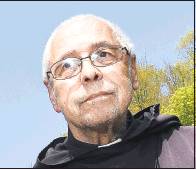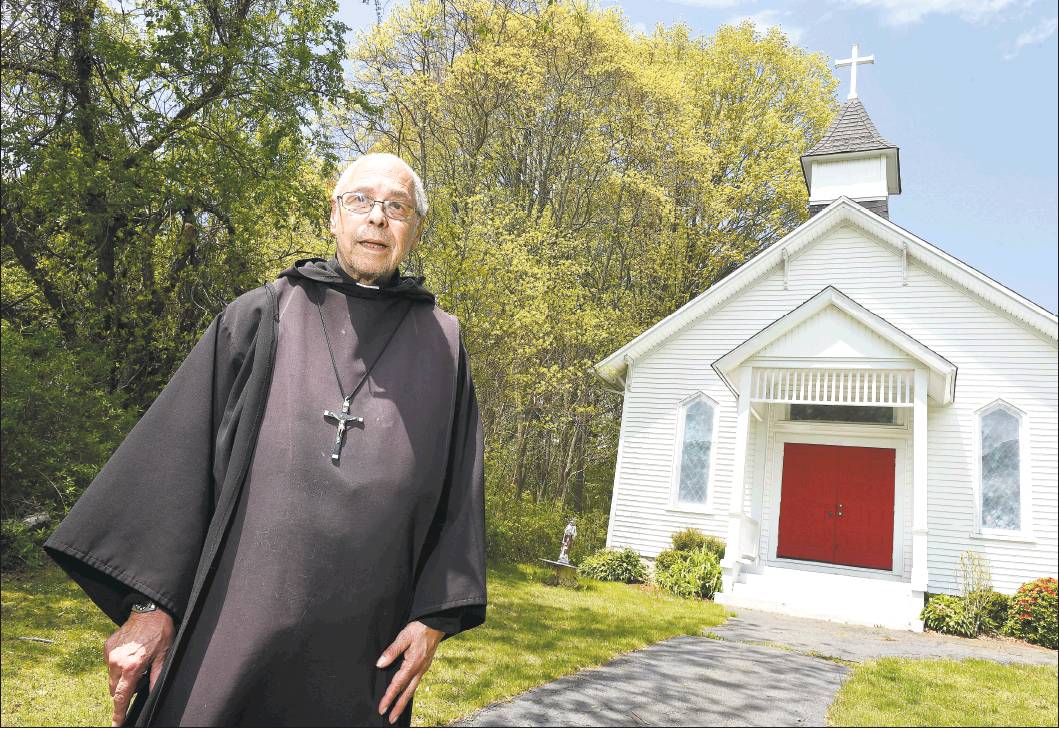ORANGE
Church sues town over virus order
Suit claims health director’s instruction to cancel services was discriminatory
By Ben Lambert
ORANGE — Our Lady of Sorrows Church has sued the town health director, alleging that he overstepped his authority in canceling religious services in the community during the coronavirus pandemic.
The church and the Rev. Bernard Champagne filed the suit against Amir Mohammad in U.S. District Court.
Christian Young, an attorney with the Bridgeport law firm Cohen and Wolf, filed the lawsuit on behalf of the church. He said this is the first time in state history that government officials have ordered a church closed.
“I am very disappointed that the public health director needs to be told that it is not OK to threaten an 87-year-old priest with jail if he so much as unlocked his church doors for anyone,” Young said.
Our Lady of Sorrows Church is a small, traditionalist Catholic parish. It is a pre-Vatican II church and Champagne is known for offering Masses in Latin. It is independent, not part of the Archdiocese of Hartford.
According to the complaint, written by Young, Mohammad issued an order March 16 declaring that “all devotional or religious acts such as daily and weekly congregational prayers, and other religious gatherings shall be canceled until further notice.”
The church alleges that Mohammad did not have the authority to explicitly cancel services, as Gov. Ned Lamont had only limited gatherings to 50 or fewer people at that time, and a later executive order cutting meetings to five or fewer people excluded places of worship.
“Despite exempting large categories of commercial and non-religious entities from mandatory closures, and despite Governor Lamont’s explicit orders that religious gatherings and churches remain open, Defendant Mohammad has and does continue to prohibit faith-based and religious gatherings regardless of the minimal and ‘statecompliant’ number of people who would be in attendance, and, regardless of the religious congregants’ ability to maintain social distancing and personal hygiene practices,” Young wrote in the complaint.
“The Defendant has explicitly and unjustifiably targeted all individuals and religious institutions for enhanced restrictions and blanket closures and prohibitions despite permitting social gatherings and commercial communing under safety protocols,” the complaint alleges.
The suit claims Mohammad’s actions violate the First and Fourteenth amendments to the U.S. Constitution, as well as the Religious Land Use and Institutionalized Persons Act.
It also alleges that the Orange Police Department has unlawfully enforced Mohammad’s order, although the department and town are not named as defendants in the suit.
While First Selectman Jim Zeoli allegedly told Young that Mohammad’s order “may change” on May 20, when Lamont is expected to ease restrictions to some extent, the suit argues the alleged discrimination should cease immediately.
Young also has filed a request for a restraining order to stop Mohammad’s order from being enforced for the time being.
“The ongoing hostile religious discrimination by the Defendant will compound harm and injury by preventing the Plaintiffs and those similarly situated every day it is permitted to continue, and, with particularity this coming weekend where the days commonly captioned as Saturday and Sunday are historic and traditional days of worship in many religious gatherings including those of the Judeo Christian faiths,” Young wrote in the complaint.
Attorney Vincent Marino, representing Mohammad in the matter, said the town would defend the order, which he said comported with Lamont’s orders, canceled in-person worship services, not worship entirely, and was designed to “slow the spread of this deadly pandemic and preserve human life.”
“The Town of Orange respects, honors and works to protect everyone's constitutional rights. We all have compromised certain liberties in this time of pandemic. The Town of Orange acknowledges that citizens have a constitutional interest to assemble and worship, but the public has a greater interest in saving human lives. It is no exaggeration to recognize that the stakes for the residents of the Town are life-or-death,” said Marino in a statement.
He said that the town “regrets that the parishioners of Our Lady of Sorrow felt the need to file a legal proceeding” at this time, nearly two months after Mohammad’s order and a few days before religious service could resume on May 20.
“We all look forward to when this pandemic ends and when we can resume ‘normal life,’ but until then, we all need to work together to protect each other,” said Marino. “Orange has a long history of ‘community’ and in these difficult times, our Town remains a community that stays together in spirit, even when we must be physically apart.”
Zeoli said he stood behind Mohammad’s decision, which he believes was made for the benefit of all town residents, not out of any sort of malice.
He said he was familiar with the Our Lady of Sorrows Parish, as his parents donated an organ to the church when it first opened.
Zeoli also noted that the law firm of Cohen & Wolf was the town’s main legal representative up until approximately six weeks ago, and said he hoped there was no ulterior motive behind the suit.
Young said Zeoli was “inartfully attempting to create a smokescreen from the only very significant issue that caused the present action,” in raising the idea of an ulterior motive.
“(That very significant) issue is whether or not the town public health director can order all religious institutions be closed on his say-so, and then legally threaten the church and (its) Pastor with criminal action and incarceration if it unlocks its church doors,” said Young. “There is no other motive.”
David McGuire, executive director of the ACLU of Connecticut, said there should be a balance between rights and safety constraints in periods that pose an “immediate and grave risk” to the public health.
“The freedom to attend worship services is one of our most important rights, but government officials may temporarily limit such gatherings in circumstances where medical and scientific experts agree that large assemblies of people pose an immediate and grave risk to the public health,” McGuire said in a statement. “Any public health measure limiting civil liberties should be re-evaluated if the medical and scientific consensus changes.”
Staffer Dan Tepfer contributed to this story. william.lambert @hearstmediact.com

